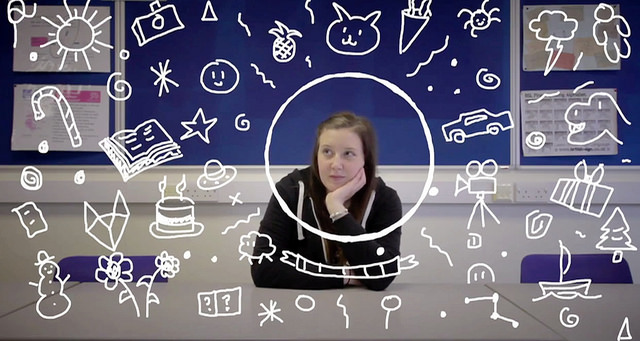I’m one of those people who has many “irrational anxieties.” I don’t feel comfortable swimming in the ocean even though I live by one of the safest waters on the planet.
When my lover spends time with another woman, I worry that he might like her better—even though there is no reason for me to worry or be jealous. Sometimes I keep telling myself, “Everything is okay, there’s no need to be anxious,” but my body signals that it doesn’t believe what my mind is trying to say.
We all have our own daily fears and anxieties, and we know how irrational they sometimes are. Yet, we cannot bring ourselves to stop worrying. Have you also experienced this and wonder why?
Anxiety is a state of arousal in the sympathetic nervous system (SNS). The SNS gets triggered when we are in danger, but also when real or imaginary situations trigger fear or anxiety in us. The SNS response is necessary for survival. When we face danger, the SNS takes over.
Our biochemistry prepares our body for fighting or running. Our heart beat becomes faster, our mind becomes alert and the faculties of rational thinking are inhibited. We are flooded with adrenaline and the stress hormone cortisol which places us in a state of heightened arousal and stress.
Unfortunately, not only life-threatening situations cause a predominant activation of the SNS. Any situation that is subjectively perceived as challenging, frightening or stressful causes a sympathetic predominance. Giving a presentation, an argument with your boss, jealousy, fear, anger—they all activate our SNS.
This nervous system response happens automatically. It is an instinctual reaction triggered in the hypothalamus and brain stem that happens without the interference of thought. It is an instinctual response that we are all born with because it is necessary for survival. Our rational higher thinking takes place in the neocortex. This part of the brain gives us our capacities for reasoning, intelligence and logic. If we are reactive, it means that we are responding to a situation instinctively without mindfulness and lacking a higher perspective. Reacting automatically to a trigger happens to the best of us, but more so for some than for others. We can develop our higher thinking faculties by taking a course on how to manage our emotions, attend workshops on self-improvement, see a therapist or practice mindfulness.
But even in mindful people who have developed the ability to observe their own internal processes and gain a certain power of observation that increases their capacity to experience them, we often see that the mind and the body don’t react in harmony. For example, we observe ourselves getting anxious over a situation. Our mind knows that we shouldn’t be anxious, but our body reacts with fear and our heart rate goes up, our gut contracts and we feel shaky. This split is caused by a dissociation between the rational mind and the embodied mind.
The embodied mind is fed by physiological data and can be a force of its own. When there is a dissociation between the rational and embodied mind, it doesn’t matter how much we try to convince ourselves that everything is okay. The knowledge of our body is telling us that we aren’t safe. While the origin of this dissociation can lie in trauma or past negative experiences, it is often hard to change the problem through only engaging the mind. The mind already knows that everything is okay, the problem lies in the physiology.
This can be very frustrating because it means that our emotions and physical response don’t allow us to live according to our higher ideals, principles and spiritual vision.
This became an important topic for me because I always felt like I had two people living inside myself. There was that part of me which was rational, mature, intelligent, unconditionally loving and witnessing the coming and going of life. This was the closest to what I called “me.” Unfortunately, it was often negated by my other more emotional half that was vulnerable and just wanted to feel loved.
This became even more apparent to me when life triggered my deepest wounds that traced back to my early childhood experiences. In all those times when I got triggered, my body went into fight-or-flight mode. My body would become tense and I would have a constant feeling of anxiety. For my rational mind, this instinctual reaction was a big inconvenience.
A dissociation between the rational mind and physiological response can leave us in unnecessary and extended periods of sympathetic arousal that over time suppresses our immune system and damages our health. This is why being in a relationship, job, or living a lifestyle where we feel insecure, unloved, stressed, jealous, unappreciated or incompetent is dangerous for our health in the long run.
Healing takes place on many different levels. Apart from practicing meditation and mindfulness, it is important to also address the embodied mind and the nervous system through mind-body practices. All mind-body practices will help a great deal in integrating the different aspects of the self. As a yogi and yoga teacher I found a lot of help in yoga. Whatever practice you choose, training the autonomous nervous system is important to educate our bodies on how to appropriately respond to the daily life challenges.
A healthy nervous system is able to recognize danger and react appropriately (such as in the case of a physical threat) and able to relax when there is no danger, such as when our emotions are triggered because of our pain bodies. While yoga isn’t a quick-fix to all our problems, it has the ability to take us to our core. Over time and with practice, it helps to reduce anxiety and harmonizes our superior rational faculties with our embodied experience. This allows us to experience a deeper integration, and to experience ourselves as more whole, more at peace and more fulfilled.
Author: Deniz Aydoslu
Editor: Travis May
Image: Flickr/Fixers







Read 0 comments and reply